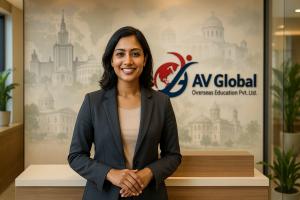AV Global Overseas Launches New Initiatives to Empower Indian Students for Study Abroad Success
Leading education consultancy unveils expanded counseling, test prep, and scholarships for Indian students planning to study MBBS abroad.
MUMBAI, MAHARASHTRA, INDIA, June 13, 2025 /EINPresswire.com/ -- AV Global Overseas, a trusted overseas education consultancy, is proud to introduce its specialized MBBS abroad program for Indian students. The initiative supports aspiring doctors in securing admissions to leading medical universities in Georgia, Russia, Kazakhstan, Armenia, Nepal, Bangladesh, and Uzbekistan—countries recognized for affordable education, global recognition, and a welcoming environment for international students.
Why Indian Students Choose MBBS Abroad
With limited government seats and high fees at private medical colleges in India, more students are looking abroad for quality medical education. AV Global Overseas simplifies the process, guiding students through every step—from university selection and application to visa processing and pre-departure support.
Key Benefits
Affordable Tuition: MBBS abroad costs significantly less than private colleges in India, with annual fees ranging from $3,000 to $7,000 in many destinations.
Globally Recognized Degrees: Partner universities are approved by the National Medical Commission (NMC), WHO, and other international bodies.
English-Medium Instruction: Most courses are taught in English, making it easier for Indian students to adapt.
Modern Infrastructure: Students benefit from advanced labs, hospitals, and experienced faculty.
No Donation or Capitation Fees: Admission is transparent, with no hidden costs.
Safe, Welcoming Environment: Countries like Georgia, Russia, and Kazakhstan are known for their hospitality and large Indian student communities.
NMC Guidelines for MBBS Abroad
To practice medicine in India after studying abroad, students must:
Complete at least 4.5 years of academic study and a 12-month internship in the same country.
Study in English-medium programs.
Qualify NEET-UG.
Attend NMC and WHO-recognized universities.
Avoid mid-course transfers.
Country Highlights
Georgia: Offers English-medium MBBS at Tbilisi State Medical University, Batumi Shota Rustaveli State University, and others.
Russia: Known for Crimea Federal University, Kazan Federal University, and Bashkir State Medical University.
Kazakhstan: Features Kazakh National Medical University and South Kazakh State Medical University.
Armenia: Yerevan State Medical University is a top choice.
Nepal: Tribhuvan University and Kathmandu University are popular.
Bangladesh: Dhaka Medical College and Shaheed Suhrawardy Medical College are preferred for their high FMGE pass rates.
Uzbekistan: Emerging as a destination for modern, English-medium MBBS programs.
AV Global Overseas: Your Trusted Partner
AV Global Overseas provides:
Personalized counseling and university selection.
Comprehensive admission and visa support.
Transparent, ethical guidance.
Ongoing support throughout the MBBS journey.
Success Stories
Hundreds of Indian students have achieved their medical dreams through AV Global Overseas, now practicing as doctors in India and globally.
How to Apply
Indian students interested in MBBS abroad can contact AV Global Overseas for a free expert counseling session. The team will help with university shortlisting, application preparation, visa arrangements, and pre-departure orientation.
About AV Global Overseas
AV Global Overseas is a leading overseas education consultancy based in Nagpur, India, dedicated to helping Indian students pursue world-class medical education abroad with integrity and support.
For more information or to schedule a free counseling session, please contact AV Global Overseas directly via WhatsApp - +918530450888 or +918530490888
Vijay Kate
AV Global Overseas Education Private Limited
+91 85304 50888
email us here
Visit us on social media:
LinkedIn
Instagram
Facebook
YouTube
Other
Legal Disclaimer:
EIN Presswire provides this news content "as is" without warranty of any kind. We do not accept any responsibility or liability for the accuracy, content, images, videos, licenses, completeness, legality, or reliability of the information contained in this article. If you have any complaints or copyright issues related to this article, kindly contact the author above.
Evan Hirsch and ShopGoodwill.com® Partner to Bring Thrift to the Runway at New York Fashion Week
Licensed Travel Agency Visago.ae Launches Faster Dubai Visa Online Service
Healing Us book launch at Kean University draws massive support and sparks national debate on mental health, addiction
Więcej ważnych informacji
 Jedynka Newserii
Jedynka Newserii

 Jedynka Newserii
Jedynka Newserii

Konsument

Polacy nie korzystają z hossy trwającej na warszawskiej giełdzie. Na wzrostach zarabiają głównie inwestorzy zagraniczni
Od października 2022 roku na rynkach akcji trwa hossa, nie omija ona także warszawskiej giełdy. Mimo to inwestorzy indywidualni odpowiadają zaledwie za kilkanaście procent inwestycji, a o wzrostach decyduje i na nich zarabia głównie kapitał z zagranicy. Widać to również po napływach i odpływach do i z funduszy inwestycyjnych. Zdaniem Tomasza Koraba, prezesa EQUES Investment TFI, do przekonania Polaków do inwestowania na rodzimej giełdzie potrzeba zysków z akcji, informacji o tych zyskach docierającej do konsumentów oraz czasu.
Polityka
Obowiązek zapełniania magazynów gazu w UE przed sezonem zimowym ma zapewnić bezpieczeństwo dostaw. Wpłynie też na stabilizację cen

Unia Europejska przedłuży przepisy z 2022 roku dotyczące magazynowania gazu. Będą one obowiązywać do końca 2027 roku. Zobowiązują one państwa członkowskie do osiągnięcia określonego poziomu zapełnienia magazynów gazu przed sezonem zimowym. Magazyny gazu pokrywają 30 proc. zapotrzebowania Unii Europejskiej na niego w miesiącach zimowych. Nowe unijne przepisy mają zapewnić stabilne i przystępne cenowo dostawy.
Infrastruktura
Gminy zwlekają z uchwaleniem planów ogólnych zagospodarowania przestrzennego. Może to spowodować przesunięcie terminu ich wejścia w życie

Reforma systemu planowania i zagospodarowania przestrzennego rozpoczęła się we wrześniu 2023 roku wraz z wejściem w życie większości przepisów nowelizacji ustawy z 27 marca 2003 roku. Uwzględniono w niej plany ogólne gminy (POG) – nowe dokumenty planistyczne, za których przygotowanie mają odpowiadać samorządy. Rada Ministrów w kwietniu br. uchwaliła jednak ustawę o zmianie ustawy z 7 lipca 2023 roku, a jej celem jest zmiana terminu obowiązywania studiów uwarunkowań i kierunków zagospodarowania przestrzennego gmin na 30 czerwca 2026 roku. Wskazana data może nie być ostateczna z uwagi na to, że żadna z gmin nie uchwaliła jeszcze POG.
Partner serwisu
Szkolenia

Akademia Newserii
Akademia Newserii to projekt, w ramach którego najlepsi polscy dziennikarze biznesowi, giełdowi oraz lifestylowi, a także szkoleniowcy z wieloletnim doświadczeniem dzielą się swoją wiedzą nt. pracy z mediami.











.gif)

 |
| |
| |
|